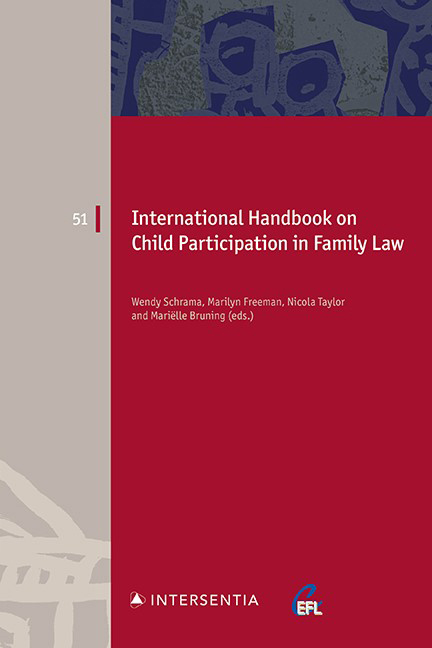Book contents
England and Wales
Published online by Cambridge University Press: 10 December 2021
Summary
INTRODUCTION
In mid-2018 England and Wales had an estimated population of 59,115,800, of which 12,584,403 (21%) were children aged 0 – 18 years. In 2017 there were 101,669 divorces of opposite-sex couples in England and Wales (the lowest since 1973), 338 divorces of same-sex couples, and 1,217 dissolutions of civil partnerships. Between 2008 and 2018 5 there was a 25.8% increase in the number of people who live together as a family without being married to each other, making this the fastest-growing family type in England and Wales and, indeed, the UK as a whole. Given that there is an increased likelihood that such families will break down as against married couples, the fact that there are less divorces does not necessarily mean there are less family breakdowns. Although there are no statistics on the breakdown of family relationships outside marriage or civil partnership, it is clear that the 3.9 million children who are part of the 2.5 million separated families in England, Wales and Scotland are directly impacted by the decision-making processes which take place about their post-separation care arrangements. If those with parental responsibility for the children are unable to agree what these arrangements should be, the decisions will be made through agreement in mediation or some other form of dispute resolution, or by the court in judicial proceedings.
England and Wales has a Family Court which deals with all family cases, including all those concerning the upbringing and status of children except those invoking the inherent jurisdiction of the High Court and international cases concerning applications relating to child abduction and matters of jurisdiction, recognition and enforcement under the 1996 Hague Protection of Children Convention. These latter cases are heard by the Family Division of the High Court. Whenever a court decides an issue relating to a child's upbringing, its paramount consideration is the child's welfare.
STATUTORY PROVISIONS
DOMESTIC PRIVATE CHILD LAW PROCEEDINGS
There is no mandatory provision governing children's participation in domestic private child law proceedings. However, by section 1(3)(a) Children Act 1989, the court must have regard to the ‘ascertainable wishes and feelings of the child concerned (considered in the light of his age and understanding)’. The Act is silent on how these wishes and feelings should be ascertained.
- Type
- Chapter
- Information
- International Handbook on Child Participation in Family Law , pp. 171 - 184Publisher: IntersentiaPrint publication year: 2021



